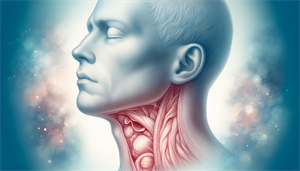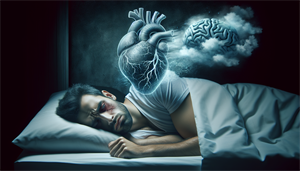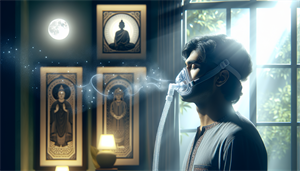Have you ever thought of sleep as a potentially dangerous activity? It’s a scary thought, isn’t it? But for millions of people worldwide, this is a bitter reality. A condition known as sleep apnea can turn a peaceful night’s rest into a life-threatening situation.
But what makes it so dangerous, and can sleep apnea kill you? How can you protect yourself? Let’s find out.
Key Takeaways
-
Untreated sleep apnea significantly increases the risk of serious conditions like heart disease, high blood pressure, and sudden cardiac death, particularly in those with severe obstructive sleep apnea, older individuals, and those with very low oxygen levels.
-
Symptoms of sleep apnea include loud snoring, gasping for air at night, excessive daytime sleepiness, and fatigue, which should prompt immediate consultation with a sleep medicine specialist for timely diagnosis and treatment.
-
Treatment options for sleep apnea include CPAP therapy, lifestyle changes, and in severe or persisting cases, oral appliances, adaptive servo-ventilation devices, or surgical interventions, which can mitigate the associated health risks and improve quality of life.
The Lethal Potential of Sleep Apnea

Sleep apnea is not just a matter of noisy snoring or daytime fatigue; it can have serious health implications. The disorder can lead to conditions such as heart disease, high blood pressure, and even sudden cardiac death. Imagine, a person could literally die from sleep apnea if left untreated. Prompt recognition and treatment of this sleep disorder is essential.
Individuals with severe obstructive sleep apnea who are over 60 years of age, exhibit very low oxygen levels, or have more severe apnea face a particularly high risk of sudden death. This highlights the importance of closely monitoring and managing these risk factors. In fact, untreated sleep apnea can increase the mortality rate by up to 4.3 times compared to the average population. Let’s further explore these risks.
The Link Between Sleep Apnea and Sudden Cardiac Death
Cardiovascular disease is a leading cause of death worldwide, and sleep apnea is a significant contributor to this grim statistic. The link between obstructive sleep apnea and sudden cardiac death is not fully understood, but the risk of sudden cardiac events is significantly increased in individuals with this condition.
Those with severe sleep apnea, particularly in cases of obstructive sleep apnea, face an elevated risk of all-cause mortality, especially from cardiovascular disease. Clearly, sleep apnea should not be taken lightly. What, however, escalates the danger in severe cases of sleep apnea?
Severe OSA and Its Dire Consequences
When people with sleep apnea experience falling asleep, they repeatedly stop breathing, sometimes hundreds of times a night. In severe cases of obstructive sleep apnea, these breathing interruptions can happen 30 or more times per hour. This can lead to serious repercussions, such as:
-
a higher risk of sudden death, especially in older individuals and those with preexisting health conditions
-
increased risk of heart attack and stroke
-
daytime sleepiness and fatigue
-
difficulty concentrating and memory problems
-
mood changes and irritability
-
decreased quality of life
It is important for individuals with mild sleep apnea to seek treatment to manage their condition and reduce these risks, which can also help prevent sleep apnea from worsening.
Unveiling Sleep Apnea: Types and Definitions

Sleep apnea is not a one-size-fits-all condition. There are three main types: obstructive sleep apnea, central sleep apnea, and complex sleep apnea. Each type has its own set of characteristics and risks associated with it.
Recognizing the Symptoms of Sleep Apnea

The first step towards getting the necessary help is to identify the symptoms of sleep apnea. Key indicators of this condition include:
-
Loud snoring
-
Gasping for air during the night
-
Excessive daytime sleepiness
-
Fatigue
But there are other signs too, so it’s important to consult a healthcare professional for a proper diagnosis.
Untreated Sleep Apnea: A Silent Culprit

Untreated sleep apnea is a precarious condition, akin to walking a tightrope over a chasm of health complications. It’s a silent culprit that can lead to serious cardiovascular complications, making sleep apnea dangerous. Some of these complications include:
-
hypertension
-
stroke
-
heart failure
-
coronary artery disease
The Role of CPAP in Preventing Sleep Apnea Deaths

The good news is, sleep apnea is treatable, and one of the most common treatments is Continuous Positive Airway Pressure (CPAP) therapy. This therapy uses a machine to deliver humidified air through the nasal passages, helping maintain an open airway during sleep.
Overcoming Barriers to Effective CPAP Therapy
Despite its high effectiveness, CPAP therapy for treating sleep apnea comes with its own set of challenges. Many patients struggle with adherence to the therapy, which can lead to increased health risks.
Lifestyle Adjustments to Combat Sleep Apnea
Besides medical treatments, lifestyle changes can also help combat sleep apnea. Such changes can help alleviate symptoms and reduce the severity of the condition.
When to Consult a Sleep Medicine Specialist
Should you experience symptoms of sleep apnea, consulting a sleep medicine specialist immediately is of utmost importance. Early diagnosis and treatment can significantly reduce the risk of life-threatening complications.
The Impact of Sleep Apnea on Daily Life
Beyond the physical risks and health issues, sleep apnea can also have a significant impact on your daily life. Issues like mood swings, concentration problems, and impaired memory can result from symptoms such as excessive daytime sleepiness.
Treatment Alternatives for Sleep Apnea Patients
For those who cannot tolerate CPAP therapy or have persistent sleep apnea despite treatment, there are several alternatives. Alternatives may encompass oral appliances, adaptive servo-ventilation (ASV) devices, and other airway pressure machines.
Surgical Options for Persistent Cases
For patients with persistent sleep apnea or specific anatomical issues, surgical treatments may be a viable option. These can include:
-
Tissue removal
-
Tissue shrinkage
-
Implants
-
Jaw repositioning
Navigating Health Conditions Linked to Sleep Apnea
Managing sleep apnea is a critical step in preventing the development of related health conditions. Conditions such as cardiovascular disease, diabetes, and cognitive decline that are linked to sleep apnea can exacerbate the risk of death.
Summary
To sum up, sleep apnea is a potentially lethal condition that can have wide-ranging impacts on your health and quality of life. From an increased risk of sudden cardiac death to cognitive decline and reduced work performance, the dangers of untreated sleep apnea are far-reaching.
Frequently Asked Questions
What happens if you don't treat sleep apnea?
Untreated sleep apnea can lead to dangerous complications such as heart damage and heart failure, as it puts a strain on the heart and increases pressure in the blood vessels. It is important to seek treatment to avoid these potential risks.
Can sleep apnea cause death while sleeping?
Yes, sleep apnea can cause death while sleeping, especially in older individuals with more severe apnea and very low oxygen levels. Although rare, it's important to be aware of this potential risk.
Does your heart stop when you have sleep apnea?
Yes, sleep apnea can cause abnormal heart rhythms and stress the heart, which may lead to sudden cardiac death. These factors suggest that the heart may stop during sleep apnea.
Symptoms of sleep apnea?
If you experience sudden awakenings with gasping or choking, difficulties with memory and concentration, and unusual moodiness or irritability, you might have sleep apnea.
What lifestyle changes can help combat sleep apnea?
Making lifestyle changes such as weight loss, regular exercise, quitting alcohol and tobacco, and changing sleep positions can help in preventing and managing sleep apnea. It's important to make these changes for a healthier lifestyle.


